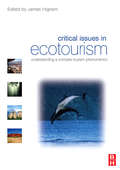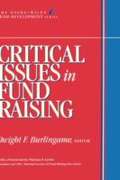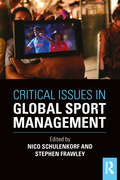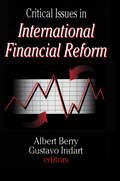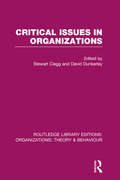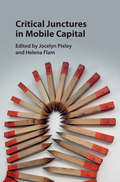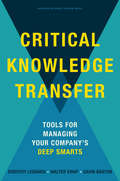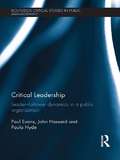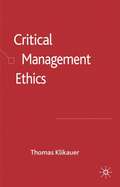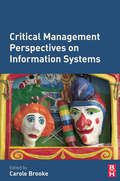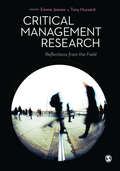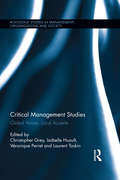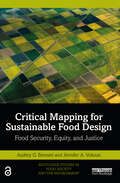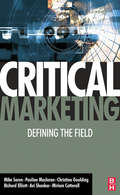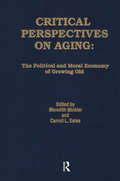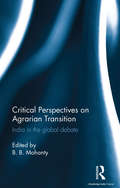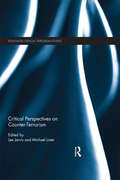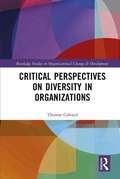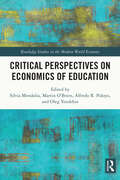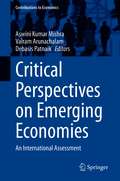- Table View
- List View
Critical Issues in China's Growth and Development
by Eden S.H. YuIn approximately two decades China has transformed from a stagnant socialist economy to one that is vibrant and largely market-oriented. Given China's size, rapid economic growth, and her increasing importance as an economic and political power, the country's growth and development have aroused major interest among academics and policymakers worldwide. Written by a distinguished group of economists, this volume offers insight and in-depth analysis of a wide range of issues related to China's growth and development, from the role of higher education in the country's economic growth, to socioeconomic issues such as stock market manipulation and rural-urban migration. The contributors are established scholars in the field and their research methodologies are at the frontier of modern analytical economics, including economic dynamics and computable general equilibrium analysis. The volume will be of interest to students and researchers in the areas of Chinese economic studies, finance and international economics, international business, and transitional economy.
Critical Issues in Ecotourism
by James HighamCritical Issues in Ecotourism seeks to shake the current stagnant literature on the subject of ecotourism out of a state of complacency. Drawing upon emerging insights provided by pre-eminent scholars in the field it identifies and comprehensively addresses current critical issues. Accessible to both academic and non-academic audiences, it provides the reader with the following:* A critical, direct and hard hitting analysis of the real issues that apply to the field of ecotourism*Contributions from prominent international scholars that address issues of relevance to a diverse and international readership* Dissemination of the scholarly works of social and natural science addressing this field* A collection of works by outstanding international scholars, in a comprehensively planned and integrated bookIncorporating rigorous scientific insights in specialised fields of research, for example, identifying and protecting critical habits where tourists engage with endangered species, Critical Issues in Ecotourism is an important and ground breaking contribution set to expose the increasingly mythologized field of ecotourism.
Critical Issues in Fund Raising
by Dwight F. BurlingameMany forces from demographics to politics to business trends shape the nonprofit sector and the practice of fund-raising, but little attention has been given to the premises underlying many of the decisions fund-raisers make in their daily professional lives. This book examines the impact of different factors on this growing and changing field. Addresses the most pressing issues facing fund-raising professionals today. Discusses donors, innovative fund-raising, marketing, financial management, ethics, international philanthropy, and the fund-raising profession.
Critical Issues in Global Sport Management
by Nico Schulenkorf and Stephen FrawleyThe social, cultural and economic significance of sport has never been more evident than it is today. Adopting a critical management perspective, this book examines the most important themes and challenges in global sport management. From match-fixing, doping, bribery and corruption to corporate social responsibility, governance, and new media, it helps students, researchers and practitioners to understand the changing face of the global sport industry. Written by leading international sport management experts, Critical Issues in Global Sport Management includes twenty chapters and real-life case studies from around the world. It examines contemporary governance and management issues as well as the ethical challenges faced by the global sport industry, including questions of integrity and accountability in recent drug scandals that have been widely reported and debated. This book deals with such questions and many more, highlighting the fact that the global sport system is in urgent need of new and innovative solutions to these ongoing problems. Based on cutting-edge research from the US, UK, Australia, Europe and beyond, this book will add depth and currency to any course in sport management, sport business, sport development, or sport events.
Critical Issues in International Financial Reform
by Gustavo IndartCritical Issues in International Financial Reform addresses weaknesses of the current international financial system and potential beneficial reforms. The focus is on the countries of Latin America and the Caribbean, but the authors also take into account relevant lessons from the experience of Canada, a country highly integrated into world and hemispheric trade and financial markets.Critical Issues offers a new perspective on a discussion too often dominated by interest groups that take strong, even rigid, positions on issues with limited understanding of the technical aspects of the issues, and little concern for the interests of the developing world. Its chapters have been written by experts in the economic, political, and social aspects of the international financial integration of developing countries. Financial crises and their associated social and economic traumas are the most apparent symptom that something is amiss in the process of world economic integration. But there are also broader questions about the nature and magnitude of the benefits and costs of increased international capital flows for different groups of countries in the developing and developed worlds. For example, even in the absence of turbulence, is it optimal for all participants that capital movements be as free as possible? Does capital inflow discourage domestic savings to a degree that should cause worry? Are some types of flows inherently more beneficial than others--for instance, direct investment flows versus flows into host stock markets? How can the instability of capital movements best be curtailed? These questions concern the contributors to this volume.This volume demonstrates that the evolution of the world financial system, its various problems, and what is or is not done about them require an understanding of the links among financial, economic, and political variables. Critical Issues in International Financial Reform is an important contribution to this debate, and will be of value to researchers in economic policy, history, and international politics.Albert Berry is professor of economics at the University of Toronto and research director of the Program on Latin America and the Caribbean. Gustavo Indart is special lecturer of economics and the coordinator of the Program on Latin America and the Caribbean at the University of Toronto.
Critical Issues in Organizations: Organizations) (Routledge Library Editions: Organizations)
by Stewart Clegg David DunkerleyThis collection highlights a number of directions in which organization theory could develop. It also argues the need for an historical analysis of the sociology of organizations. Other issues discussed are the ideological stance of contemporary organization theory and the limiting framework that tends to ignore the wider social context in which organizations exist.
Critical Junctures in Mobile Capital
by Jocelyn Pixley Helena FlamDuring the recent financial crisis, the conflict between sovereign states and banks over who controls the creation of money was thrown into sharp relief. This collection investigates the relationship between states and banks, arguing that conflicts between the two over control of money produces critical junctures. Drawing on Max Weber's concept of 'mobile capital', the book examines the mobility of capital networks in contexts of funding warfare, global bubbles and dangerous instability disengaged from social-economic activity. It proposes that mobile capital is a primary feature of capitalism and nation states, and furthermore, argues that the perennial, hierarchical struggles between states and global banks is intrinsic to capitalism. Featuring authors writing from an impressively diverse range of academic backgrounds (including sociology, geography, economics and politics), Critical Junctures in Mobile Capital presents a variety of analyses using current or past examples from different countries, federations, and of differing forms of mobile capital. Proposes that mobile capital is a primary feature of capitalism and nation states, appealing to readers looking for an understanding of current economic and political issues focused on the impacts of money and finance; Highlights lack of capital controls in global banking, asking whether state needs for funding nuclear arsenals and US desires to maintain dollar supremacy create critical junctures and impasses; Promotes a shift away from ideological debates on neoliberalism and neoclassical economics and towards political and social relations of money, and outcomes on global economic activity, poverty and populations
Critical Knowledge Transfer
by Dorothy Leonard Gavin Barton Walter C. SwapHow to transfer your organization's most important knowledge-before it walks out the doorWhen highly skilled subject matter experts, engineers, and managers leave their organizations, they take with them years of hard-earned, experience-based knowledge-much of it undocumented and irreplaceable. Organizations can thereby lose a good part of their competitive advantage. The tsunami of "boomer" retirements has created the most visible, urgent need to transfer such knowledge to the next generation. But there is also an ongoing torrent of acquisitions, layoffs, and successions-not to mention commonplace promotions and transfers-all of which involve the loss of essential expertise.Dorothy Leonard and Walter Swap first addressed this acute loss of knowledge in their groundbreaking book Deep Smarts (2005). Since then, managers have repeatedly asked them for practical, proven techniques that will help transfer those deep smarts-the organization's critical, experience-based knowledge-before it's too late. Now, with coauthor Gavin Barton, the authors share a comprehensive approach to doing just that.Based on original research, numerous interviews with top managers, and a wide range of corporate examples, Critical Knowledge Transfer provides a variety of practical options for identifying your firm's deep smarts and transferring that intelligence from experts to successors. Critical Knowledge Transfer will enable managers to: Determine the seriousness of their knowledge loss Identify the deep smarts essential to their business Utilize proven techniques for transferring knowledge when its loss is imminent Identify and implement long-term transfer program apprenticeships Set up individual learning plans for successors Assess the success of their knowledge transfer initiativesThis book is essential reading for anyone managing talent in today's volatile environment.
Critical Leadership: Leader-Follower Dynamics in a Public Organization (Routledge Critical Studies in Public Management)
by John Hassard Paul Evans Paula HydeCritical approaches to leadership studies have sought to challenge the normative position of leadership as residing solely within the formal leader and have gone as far as to undermine the traditionally held assumption of leadership as a "real" phenomenon. The book offers a critical account of the nature of leadership and management in modern organizations. Specifically it examines the forces that affect the influence relationships between leaders and followers in public sector organizational settings and thus, how these relationships inform social influence processes. Although the book focuses on the case of a public sector organization in the UK, the findings are placed in the context of both leadership theory and research across the globe and the dissemination of 'new public management' worldwide. By acknowledging the criticisms concerning the weaknesses of conventional or mainstream leadership study and through the adoption of a critical perspective, Critical Leadership provides a deep and rich interpretation of the empirical material on leadership, thus making an outstanding contribution to the current literature.
Critical Management Ethics
by Thomas KlikauerWritten in the European tradition of Kant's philosophical trilogy on critique and Hegel's concept of ethical life it outlines the great traditions in ethical philosophy: Aristotelian virtue ethics, Kantian ethics, and utilitarianism. It presents modern ethics from Nietzsche, Adorno, and Habermas to Kohlberg's stages of moral development.
Critical Management Perspectives on Information Systems
by Carole BrookeCritical Management Perspectives on Information Systems provides a coherent set of reference points to show students and researchers the organizational issues of information systems in theory, method and practice. Combining fresh and insightful contributions from lead researchers in the field, the book illustrates the diversity of approaches to critical research, presents practical examples and demonstrates the lessons learnt from applying a critical approach. Exploring the management and organizational issues of information systems from a range of critical theory viewpoints, Critical Management Perspectives on Information Systems sets out the key theoretical underpinnings of different critical approaches and considers the issues associated with designing critical methodologies for systems design and study. The book is suitable for final year undergraduate, research and postgraduate courses in information systems, management and organizational studies.
Critical Management Research: Reflections from the Field
by Emma Jeanes Professor Tony HuzzardThis is an invaluable collection of reflections and experiences from world-class researchers undertaking Critical Management Studies (CMS). The editors and contributors reflect on ethics and reflexivity in critical management research, and explore the identity of the critical researcher both as an individual and working within collaborative projects. Using contemporary accounts from those engaged in real world fieldwork they outline what critical management is, and explore its relationship to management research. The book discusses the implications of critical management when: Developing research questions Managing research relationships Using various methods of data collection Writing accounts of your research, findings and analysis. Grounded in practical problems and processes this title sets out and then answers the challenges faced by critical researchers doing research in organization and management studies.
Critical Management Research: Reflections from the Field
by Emma Jeanes Professor Tony HuzzardThis is an invaluable collection of reflections and experiences from world-class researchers undertaking Critical Management Studies (CMS). The editors and contributors reflect on ethics and reflexivity in critical management research, and explore the identity of the critical researcher both as an individual and working within collaborative projects. Using contemporary accounts from those engaged in real world fieldwork they outline what critical management is, and explore its relationship to management research. The book discusses the implications of critical management when: Developing research questions Managing research relationships Using various methods of data collection Writing accounts of your research, findings and analysis. Grounded in practical problems and processes this title sets out and then answers the challenges faced by critical researchers doing research in organization and management studies.
Critical Management Studies: Global Voices, Local Accents (Routledge Studies in Management, Organizations and Society)
by Christopher Grey Isabelle Huault Véronique Perret Laurent TaskinCritical Management Studies (CMS) is often dated from the publication of an edited volume bearing that name (Alvesson and Willmott, 1992). In the two decades that have followed, CMS has been remarkably successful in establishing itself not just as a ‘term’ but as a recognizable tradition or approach. The emerging status of CMS as an overall approach has been both encouraged and marked by a growing range of handbooks, readers and textbooks. Yet the literature is dominated by writings from the UK and Scandinavia in particular, and the tendency is to treat this literature as constituting CMS. However, the meaning, practice, constraints and context of CMS vary considerably between different countries, cultures and language communities. This volume surveys fourteen various countries and regions where CMS has acquired some following and seeks to explore the different ways in which CMS is understood and the different contexts within which it operates, as well as its possible future development.
Critical Mapping for Sustainable Food Design: Food Security, Equity, and Justice (Routledge Studies in Food, Society and the Environment)
by Audrey G. Bennett Jennifer A. VokounThis book introduces critical mapping as a problematizing, reflective approach for analyzing systemic societal problems like food, scoping out existing solutions, and finding opportunities for sustainable design intervention. This book puts forth a framework entitled "wicked solutions" that can be applied to determine issues that designers should address to make real differences in the world and yield sustainable change. The book assesses the current role of design in attaining food security in a sustainable, equitable, and just manner. Accomplishing this goal is not simple; if it was, it would not be called a wicked problem. But this book shows how a particular repertoire of design tools can be deployed to find solutions and strategize the development of novel outcomes within a complex and interconnected terrain. To address the wicked problem of food insecurity, inequity, and injustice, this book highlights 73 peer-reviewed design outcomes that epitomize sustainable food design. This includes local and regional sustainable design outcomes funded or supported by public or private institutions and local and widespread design outcomes created by citizens. In doing so, this book sets the stage for an evidence-driven and evidence-informed design future that facilitates the designers’ visualization of wicked solutions to complex social problems, such as food insecurity. Drawing on an array of case studies from across the world, from urban rooftop farms and community cookers to mobile apps and food design cards, this book provides vitally important information about existing sustainable food design outcomes in a way that is organized, accessible, and informative. This book will be of great interest to academics and professionals working in the field of design and sustainable food systems. Students interested in learning about food and sustainability from across design studies, food studies, innovation and entrepreneurship, urban studies, and global development will also find this book of great use.
Critical Mapping for Sustainable Food Design: Food Security, Equity, and Justice (Routledge Studies in Food, Society and the Environment)
by Audrey G. Bennett Jennifer A. VokounThis book introduces critical mapping as a problematizing, reflective approach for analyzing systemic societal problems like food, scoping out existing solutions, and finding opportunities for sustainable design intervention.This book puts forth a framework entitled "wicked solutions" that can be applied to determine issues that designers should address to make real differences in the world and yield sustainable change. The book assesses the current role of design in attaining food security in a sustainable, equitable, and just manner. Accomplishing this goal is not simple; if it was, it would not be called a wicked problem. But this book shows how a particular repertoire of design tools can be deployed to find solutions and strategize the development of novel outcomes within a complex and interconnected terrain. To address the wicked problem of food insecurity, inequity, and injustice, this book highlights 73 peer-reviewed design outcomes that epitomize sustainable food design. This includes local and regional sustainable design outcomes funded or supported by public or private institutions and local and widespread design outcomes created by citizens. In doing so, this book sets the stage for an evidence-driven and evidence-informed design future that facilitates the designers’ visualization of wicked solutions to complex social problems, such as food insecurity. Drawing on an array of case studies from across the world, from urban rooftop farms and community cookers to mobile apps and food design cards, this book provides vitally important information about existing sustainable food design outcomes in a way that is organized, accessible, and informative.This book will be of great interest to academics and professionals working in the field of design and sustainable food systems. Students interested in learning about food and sustainability from across design studies, food studies, innovation and entrepreneurship, urban studies, and global development will also find this book of great use.
Critical Marketing
by Michael Saren Christina Goulding Pauline Maclaran Richard Elliott Miriam CaterallMarketing is still widely perceived as simply the creator of wants and needs through selling and advertising and marketing theory has been criticized for not taking a more critical approach to the subject. This is because most conventional marketing thinking takes a broadly managerial perspective without reflecting on the wider societal implications of the effects of marketing activities.In response this important new book is the first text designed to raise awareness of the critical, ethical, social and methodological issues facing contemporary marketing. Uniquely it provides:· The latest knowledge based on a series of major seminars in the field· The insights of a leading team of international contributors with an interdisciplinary perspective. A clear map of the domain of critical marketing· A rigorous analysis of the implications for future thinking and research. For faculty and upper level students and practitioners in Marketing, and those in the related areas of cultural studies and media Critical Marketing will be a major addition to the literature and the development of the subject.
Critical Materials: Present Danger to U.S. Manufacturing
by Richard Silberglitt James T. Bartis Brian G. Chow David L. An Kyle BradyThis report describes the results of a study of the sources and reliability of the supply of imported materials on which United States manufacturers are dependent.
Critical Perspectives On The Industrial Revolution (Critical Anthologies Of Nonfiction Writing)
by Josh SakolskyAs modern man's greatest growth spurt, the Industrial Revolution ushered in an era unsurpassed in the history of the modern world, from technology to industry to migration. Using an eclectic group of viewpoints including presidential addresses, anonymous testimony, and the perspectives of such figures as Jack London, H.G. Wells, and Henry Ford, this title seeks to understand the scope, origin, and effects of the Industrial Revolution. The reader is drawn into a time and place that is still affecting the world today.
Critical Perspectives on Aging: The Political and Moral Economy of Growing Old (Policy, Politics, Health and Medicine Series)
by Meredith Minkler Carroll L. EstesThis unique volume brings together 20 critical essays on aging within the context of the broad social, political, and economic factors that help shape and determine the realities of growing old. Rather than viewing aging in isolation, it explores the social creation of old age dependency and the profound influence of race, gender, and social class on what it means to grow old. It looks too at such topics as the "biomedicalization" of aging; the role of business and the media in changing societal images of the old; the fact and fiction behind "senior power"; the multibillion dollar nursing home industry; and the role of advanced capitalist nations in creating economic dependency among elders in the Third World.
Critical Perspectives on Agrarian Transition: India in the global debate
by B. B. MohantyThis book evaluates the relevance of classical debates on agrarian transition and extends the horizon of contemporary debates in the Indian context, linking national trends with regional experiences. It identifies new dynamics in agrarian political economy and presents a comprehensive account of diverse aspects of capitalist transition both at theoretical and empirical levels. The essays discuss several neglected domains in agricultural economics such as discursive dimensions of agrarian relations and limitations of stereotypical binaries between capital and non-capital, rural and urban sectors, agriculture and industry, and accumulation and subsistence. With contributions from major scholars in the field, this volume will be useful to scholars and researchers of agriculture, economics, political economy, sociology, rural development and development studies.
Critical Perspectives on Counter-terrorism (Routledge Critical Terrorism Studies)
by Michael Lister Lee JarvisThis volume examines the rationale, effectiveness and consequences of counter terrorism practices from a range of perspectives and cases. The book critically interrogates contemporary counter-terrorism powers from military campaigns and repression through to the prosecution of terrorist suspects, counter-terrorism policing, counter-radicalisation programmes, and the proscription of terrorist organisations. Drawing on a range of timely and important case studies from around the world including the UK, Sri Lanka, Spain, Canada, Australia and the USA, its chapters explore the impacts of counter-terrorism on individuals, communities, and political processes. The book focuses on three questions of vital importance to any assessment of counter-terrorism. First, what do counter-terrorism strategies seek to achieve? Second, what are the consequences of different counter-terrorism campaigns, and how are these measured? And, third, how and why do changes to counter-terrorism occur? This volume will be of much interest to students of counter-terrorism, critical terrorism studies, criminology, security studies and IR in general.
Critical Perspectives on Diversity in Organizations (Routledge Studies in Organizational Change & Development)
by Thomas CalvardDecades of investigations into diversity in the workplace have created mixed answers about what kinds of effects it has on employees and teams, and whether or not it can be managed effectively to generate positive outcomes for organizations. In contrast to mainstream work from management and psychology, critical views on workplace diversity have emerged that seek to grasp more fully the messy social and political realities of workplace diversity as they operate in context. Critical Perspectives on Diversity in Organizations therefore seeks to review, integrate and build upon emerging critical perspectives on workplace diversity to help give a fuller understanding of how employee differences affect workplace interactions, relationships, employment, inequality, culture, and society. Critical perspectives help to fill in and openly recognize many of the more far-reaching issues that pure management and psychology approaches can leave out – issues of power, inequality, politics, history, culture, and lived experiences. If organizations do not try to take these issues into account and critically reflect on them, then diversity management is likely to remain a relatively blunt instrument or worse, a hollow piece of rhetoric. This book will be of interest to international graduate students and researchers working on topics associated with equality, diversity and inclusion in organizations, as well as various organizational practitioners and activists engaged with these issues.
Critical Perspectives on Economics of Education (Routledge Studies in the Modern World Economy)
by Silvia Mendolia, Martin O’Brien, Alfredo R. Paloyo, and Oleg YerokhinThis book brings together leading scholars in the field to provide insights on economics of education. The book begins with an overview of education and human capacity development and looks at the production of education through individuals’ learning, education financing and the role of individual circumstances. It also analyses the complex relationship between education and mobility and highlights what key challenges for education systems in a global world are. Each chapter provides detailed analysis of interesting and policy relevant topics in the fields of education economics and human capacity development. This book is a useful reference for those who wish to understand the changing landscape and models of higher education in the context of digital advances and innovation. It will also be of interest to those in the areas of education and training.
Critical Perspectives on Emerging Economies: An International Assessment (Contributions to Economics)
by Aswini Kumar Mishra Vairam Arunachalam Debasis PatnaikThis volume offers fresh insights into economic development and growth in emerging economies. It includes contributions covering topics such as natural disasters and income inequalities, the environmental impact of economic growth, social preferences, information and market disorder under democracy, inflation targeting and its covariates, economic empowerment. This book is intended for scholars in the field of economics, and those interested in furthering economic development.

